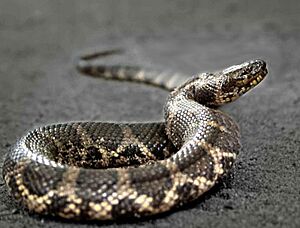Siebold's water snake facts for kids
Quick facts for kids Siebold's water snake |
|
|---|---|
 |
|
| Ferania sieboldii | |
| Conservation status | |
| Scientific classification | |
| Genus: |
Ferania
|
| Species: |
sieboldii
|
| Synonyms | |
|
|
Siebold's water snake, also known as Siebold's mud snake, is a special kind of snake. Its scientific name is Ferania sieboldii. This snake is mildly venomous. It has fangs located at the back of its mouth. It belongs to a group of snakes called the Homalopsidae family. You can only find this snake in certain parts of Asia.
Contents
What's in a Name?
The name sieboldii comes from a person named Philipp Franz von Siebold. He was a German botanist and physician. The common name, Siebold's water snake, also honors him.
Where Does It Live?
You can find F. sieboldii in several places. These include Bangladesh, northcentral India, and western Malaysia.
Its Home Environment
This snake prefers to live in natural habitats called freshwater wetlands. Wetlands are areas where the land is covered by water, like swamps or marshes.
What Does It Look Like?
Siebold's water snake has a pattern on its back. This pattern looks like the large blotches you might see on a python. However, it has a special feature that helps it live in water. Its nostrils are on the very top of its snout. This helps the snake breathe while most of its body is underwater. It also does not have special pits around its mouth called labial pits.
This snake can grow to be quite long. It can reach a total length of about 89 cm (35 in). This measurement includes both its body and its tail. For example, a female snake of that length had a tail that was 11 cm (4.3 in) long.
Life Cycle
F. sieboldii is a viviparous snake. This means that the mother snake gives birth to live young. The babies hatch from eggs inside her body, then she gives birth to them alive.


